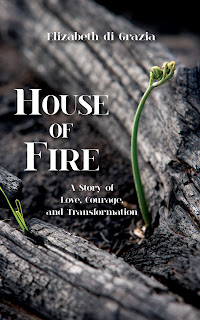At my July week-long retreat on
Madeline Island, I watched her dismantle her book as she knew it--much
writing already completed, but the structure not yet working--and we
talked a lot about her options with timelines, backstory and present
story, the threading of her life now and her childhood. She came up
with a unique and workable structure during that week and continued
building her book through classes and mentorships.
Not long ago, I got the announcement that her memoir was being published. House of Fire has just been released by North Star Press.
I interviewed Elizabeth for the blog this week.
Not long ago, I got the announcement that her memoir was being published. House of Fire has just been released by North Star Press.
I interviewed Elizabeth for the blog this week.













